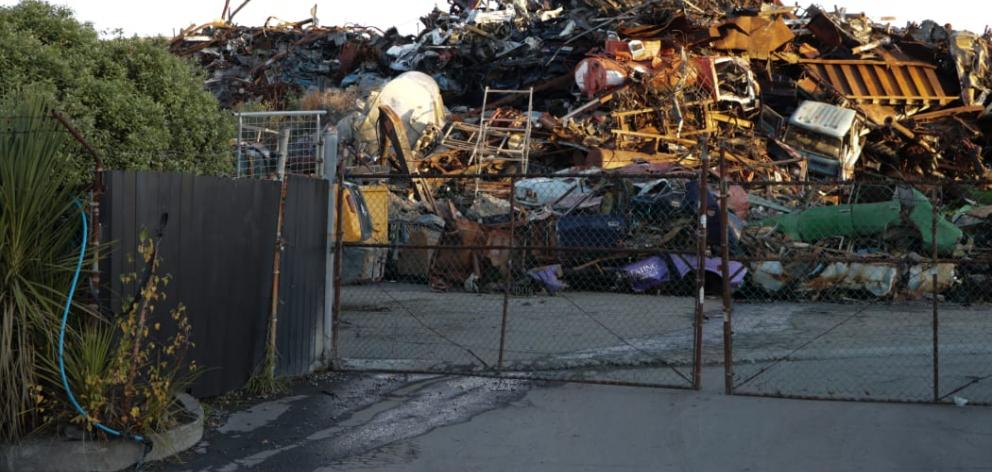People who live next to a Christchurch scrap metal yard piled high with wrecked old cars have renewed their calls for the company to relocate as the regional council considers a resource consent application.
The National Steel yard on Garlands Rd in Woolston was the site of a major blaze two years ago, when hundreds of old cars were engulfed in flames in a suspected arson.
Environment Canterbury (ECan) investigated the site in 2021 after receiving complaints from the public.
The investigation found contaminated stormwater was running from the site and could enter the Ōpāwaho Heathcote River, in breach of the Resource Management Act, so ECan issued an abatement notice ordering the company to apply for resource consent.
National Steel filed its application last November, although the regional council was yet to decide if it would be publicly notified because it was waiting for more information from the company.

"There will be oil and petrol residue in the cars being crushed, and they're piled right next to the river," he said.
Campbell said he felt vibrations and heard the rumble of diggers and cars being crushed, often from early in the morning until late at night, from his family home across the road.
"I hear it while I'm reading to the kids at night. It feels like heavy industrial activity right next to a residential area. I'm sure there's a better place for it," he said.
While Campbell supported businesses that recycled cars and scrap metal, he said he had reported concerns about National Steel to the Christchurch City Council and wanted public consultation on the resource consent application.
"We have to be part of that process," he said.
Annette Kaldor, who has lived opposite National Steel for three years, said she could not sleep on the night of the fire and had her car packed ready to leave.
"It was very scary. I could see big blasts going up and I felt the heat from my driveway," she said.

"Smells of rusty metal waft into my house, there could be another fire, and it looks terrible," she said.
"We should be consulted. Especially after the fire, and with the type of business it is."
National Steel's business on Garlands Rd was legally permitted because it was within an industrial zone.
The company had applied to release treated stormwater into the river, which required consent because the site was contaminated and within a community drinking water protection zone.
National Steel general manager Brett Howlett said he did not understand why neighbours had not approached the business about their concerns.
He said publicly notifying the consents would only draw out what had been a very lengthy and expensive process.
National Steel had worked with councils to address concerns, there was no smell coming from the yard and the company was being blamed for offensive odours coming from other businesses, Howlett said.

Howlett said the 2022 fire was caused by arsonists and the company had made steps to mitigate fire risk and improve the appearance of the yard.
ECan consent planning manager Aurora Grant said the application would only be publicly notified if the effects on the environment were "more than minor". Public interest was not one of the criteria for publicly notifying a resource consent application.
ECan said there was currently no run-off from the scrap yard to the road, stormwater network or the Heathcote river.
Christchurch City Council received eight official complaints about the yard since it opened in 2018, including reports of excessive noise, rubbish and concerns about oil and petrol run-off into the nearby river.

A council spokesperson said none of the complaints received since then had amounted to any breaches.
The council had no plans to change Woolston's zoning, but staff would provide advice about managing the "interface" between industrial and residential zones, they said.
Linwood Ward councillor Yani Johanson said the regional council should publicly notify the consent.
"It would seem inherently unfair if the community did not get a say," he said.
He said current planning rules were inadequate.
"The fact that a massive dumping yard for scrap metal and cars can be established adjacent to a residential neighbourhood without any resource consent required highlights a gap in the city's district plan," he said.
Ōpāwaho Heathcote River Network chair Quentin McDonald said it was unfortunate potentially polluting industrial activity was still allowed near the river, but the group understood the difficulty of changing zoning rules.
He said consequences of unexpected events like fires should be evaluated when consents were granted to businesses near ecologically-sensitive areas.
"The Ōpāwaho Heathcote river is unfortunately already one of the most polluted urban rivers in New Zealand and needs protection," he said.
Banks Peninsula MP Vanessa Weenink said she met Ōpāwaho Heathcote River Network members, local people, and councillor Yani Johanson earlier this year to discuss their concerns.
"[The issue] was very much highlighted by the fires and the site is a real eyesore," she said.
Brett Howlett said Johanson and Weenink's comments were "unprofessional and unjust", because the company's industrial activity was permitted and the fire was "totally beyond National Steel's control".
In April this year, a 10m-high car pile at a National Steel scrap yard in South Auckland went up in flames and burned for about 90 minutes before firefighters extinguished it.















